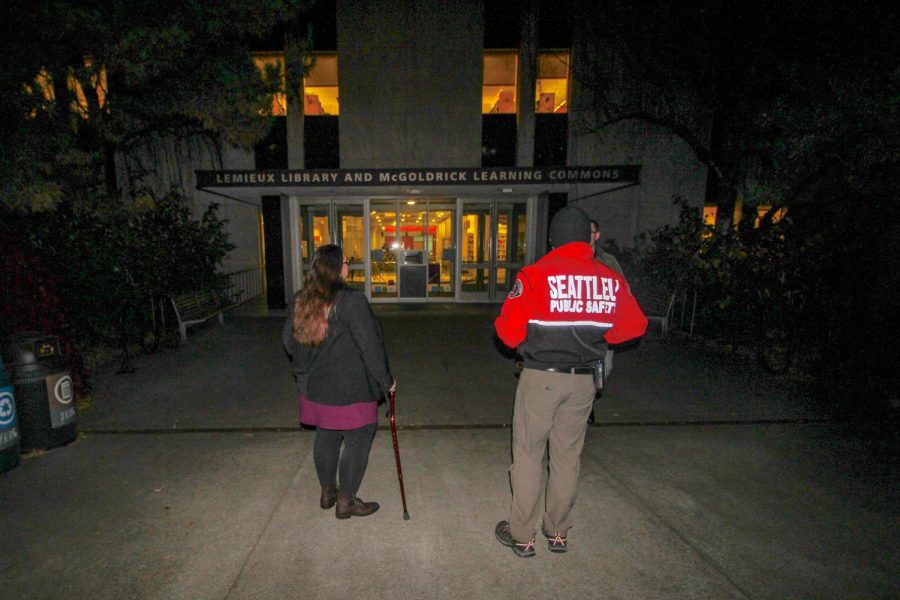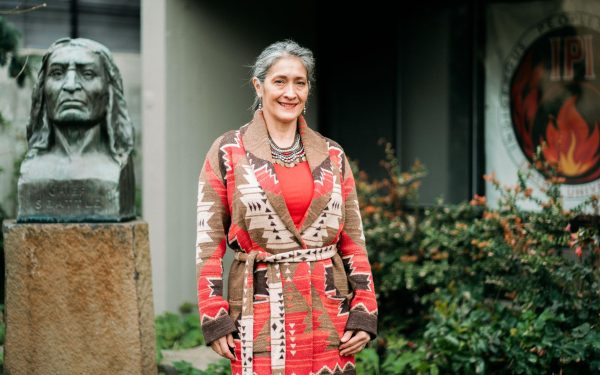DPS Evaluates Campus Security, Draws No Student Participation
Public Safety officials and other head figures of the university’s departments analyze the prospect of better lighting outside Lemieux Library.
The Public Safety Night-Walk is a yearly event that welcomes students, staff and faculty to go on a guided tour of the campus on the hunt for obstructing foliage, blind corners, burnt out lightbulbs and other hazardous things.
Spaces with bad lighting are difficult for Seattle University’s Department of Public Safety (DPS) to patrol because the lack of lighting and surrounding foliage can make them a safety hazard for students late at night.
The walk has been held for the last 12 years, with the goal of giving Seattle U community members the opportunity to discuss problems directly with DPS. An email with the details of the walk was sent out to the community, however, no students participated in the walk.
Craig Birklid, the executive director of Public Safety, helped lead the Night- Walk and acted as the DPS point of contact for any safety improvements.
“The whole thing [Night-Walk] is done because we want community involvement. Folks share their input because campus safety is something the entire community needs to work on,” Birklid said. “It’s all about perception and how people interact with the campus. So we really try to get folks to do the walk with us and give us that feedback.”
The night-walk works under the principles of Crime Prevention Through Environmental Design (CPTED). One important part of CPTED is how the foliage around campus is cut to allow community members to see into campus and locate hiding places easily.
With the proper pruning of bushes, the landscaping team is able to eliminate hiding spaces while still creating lush landscapes. Other safety precautions observed during the Night-Walk include making sure there are lines of sight to windows, proper maintenance of grounds and that the boundaries of campus are clearly marked.
Shannon Britton, the grounds and landscaping manager for the university, is in charge of making sure that these important changes to foliage are maintained throughout the school year.
She says it is a constant struggle to preserve the beauty of campus while also ensuring security concerns are met. With such a vibrant campus and lots of secluded spaces for spiritual purposes, the key is making sure spaces are both inviting and safe.
“We have to be clever to maintain that balance. We are very fortunate that we have gardeners who are clever and very experienced in what they do,” Britton said. “They have mastery over the different techniques that allow view into a garden space, but it may not even look to the untrained eye that anything had changed at all.”
Many new additions to the schools landscape were built because of discussions held during the Night-Walk, explains Robert Schwartz, the associate vice president of Facilities Services.
“We generate a very detailed list of improvements that we need to make during the walk, and we work on checking things off. We get the smaller projects out within a day or two, like if a light needs to get changed, and sometimes we have larger projects that we need to plan and fund,” Schwartz said.
In years past, the walk has brought up concerns regarding the West library entrance parking lot, which was lit by only one light pole. It has since seen the addition of two more light poles with multiple fixtures on each pole.
This is not a cheap undertaking for the school; the Seattle U Board of Trustees has allocated $900,000 to increase campus safety. In total, the university has spent $400,000 on projects that increase student safety since 2016. These projects include putting interior locking doors in classrooms, more lighting fixtures in key places around campus and upgrades to security cameras and fire alarm systems.
The Night-Walk is held to ensure that student safety is a priority for the school. If any areas make students uncomfortable, Birklid encourages students to submit work orders in an attempt to rectify these problems.
“We know that students are busy, but if you do see something that makes you think ‘I don’t like the way this feels’ let us know and we will try to make campus that much more inviting for you.”
Logan may be reached at [email protected]










